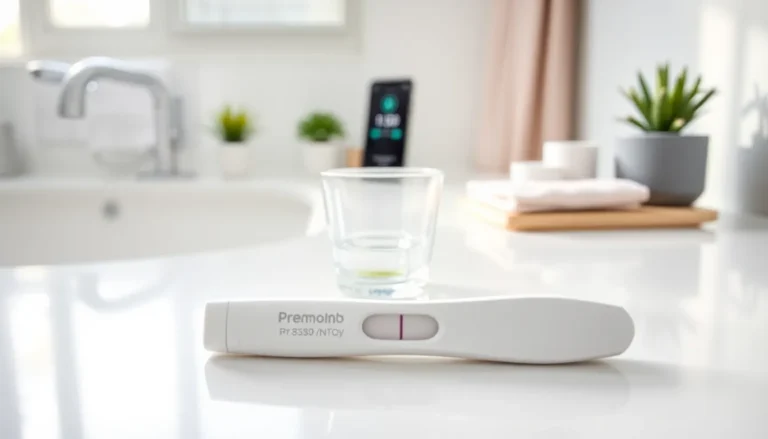It’s a scenario most people wouldn’t expect, finding out that even though having a tubal ligation, pregnancy could still be on the table. But before you start building a nursery or stockpiling diapers, let’s jump into what that really means. Often seen as a surefire way to avoid future parenthood, tubal ligation can leave many pondering the slim yet existing possibility of unexpected pregnancy. Here’s the lowdown on recognizing the signs so you can know whether you should be celebrating or simply scheduling another appointment with your doctor.
Table of Contents
ToggleUnderstanding Tubal Ligation

What Is Tubal Ligation?
Tubal ligation is a surgical procedure designed for permanent contraception. During the operation, a woman’s fallopian tubes are either blocked or cut, preventing eggs from reaching the uterus. For many, this option feels liberating, freedom from unwanted pregnancies. The procedure, sometimes whimsically referred to as “getting your tubes tied,” boasts a high success rate in preventing pregnancy.
How Tubal Ligation Works
The mechanics of tubal ligation are straightforward. It involves severing or blocking the fallopian tubes, which are the pathways eggs take to reach the uterus. With this blockade, sperm cannot meet egg, and conception is thwarted. While it’s an effective long-term solution, it’s essential to keep in mind the nuances that follow, as rare cases of pregnancy post-ligation have been documented.
Myths And Misconceptions About Tubal Ligation
Many misconceptions linger around tubal ligation. Some believe it guarantees no chance of pregnancy, this is misleading. Others worry it radically alters hormonal balances, impacting monthly cycles. While tubal ligation doesn’t affect hormone production, it subtly shifts how menstruation may feel, often leading to lighter periods or spotting. It’s easy to see why misinformation can lead to confusion and concern.
Recognizing Early Pregnancy Signs
Common Signs Of Pregnancy
Pregnancy can bring about some telltale signs. The classics include missed periods, nausea, and fatigue. These symptoms can sometimes create an uncomfortable déjà vu for those who thought their parenting days were behind them.
Less Common Signs To Be Aware Of
Plus to the usual indicators, look out for less common signs. Breast tenderness or changes in appetite might emerge as well. Some women report heightened senses of smell or bizarre food cravings. While these signs can feel like yet another round of hormonal grief, they may be your body’s way of hinting at something unexpected.
Unique Considerations Post-Tubal Ligation
Ectopic Pregnancy Risks
It’s crucial to note the increased risk of ectopic pregnancy following tubal ligation. This occurs when a fertilized egg implants outside the uterus, usually in the fallopian tubes. An ectopic pregnancy can pose serious health risks and requires immediate medical attention.
Symptoms Of Ectopic Pregnancy
Recognizing ectopic pregnancy is vital. If sharp pelvic pain, significant bleeding, or dizziness surfaces, it’s essential to seek help right away. This condition can swiftly become a medical emergency, and timely intervention is key.
Testing For Pregnancy After Tubal Ligation
When To Take A Pregnancy Test
So when’s the right time to grab that pregnancy test? Aim for at least a week after a missed period for the most reliable results. For the best accuracy, using the first-morning urine sample can enhance test outcomes, giving you that extra confidence in the results.
Understanding Test Results
Once the test has done its magic, interpreting the results is crucial. A positive result merits immediate consultation with a healthcare provider. Discarding feelings of disbelief is essential, genuine pregnancies can, in fact, occur post-ligation. Conversely, a negative result may just mean it’s time to wait a little longer or reevaluate your options and talk with a professional.
Consulting Your Healthcare Provider
When To Seek Medical Advice
If the signs of pregnancy persist or doubts linger, consulting a healthcare provider can offer clarity. They can perform necessary examinations and tests to ascertain whether pregnancy is indeed taking place. Listening to one’s body is important, and any unusual symptoms should prompt immediate discussion with a medical professional.
Preparing For A Possible Pregnancy
While the prospect of being pregnant again might be daunting, having a plan can ease anxiety. Knowing what steps to take if the test is positive will help. From prenatal vitamins to dietary changes, preparation can flip overwhelming emotions into proactive positivity.


